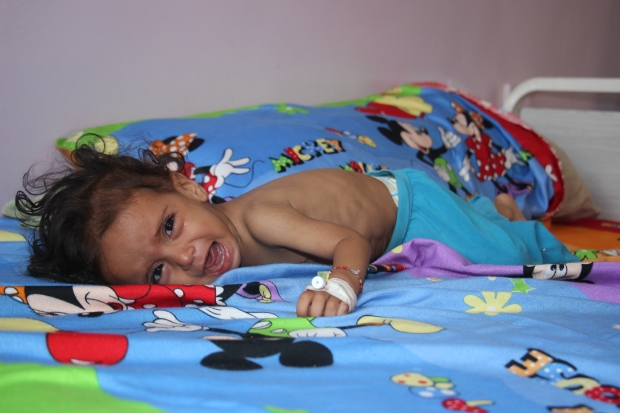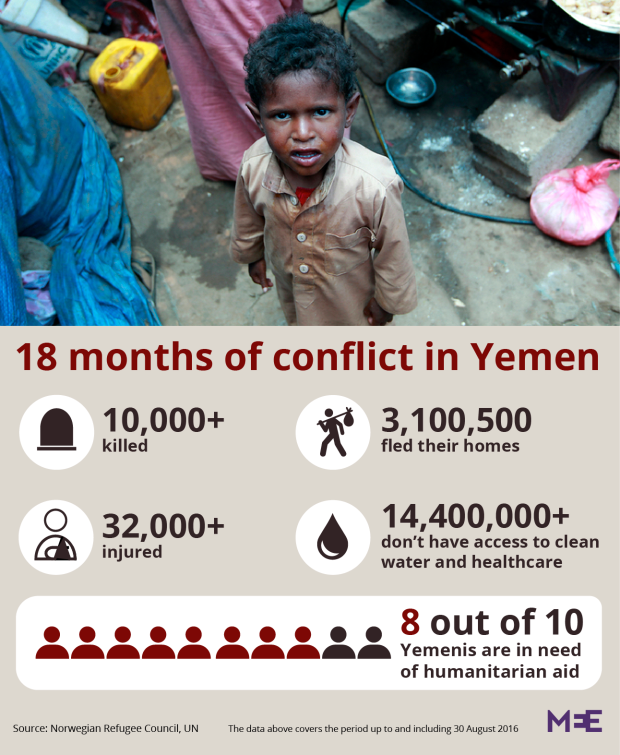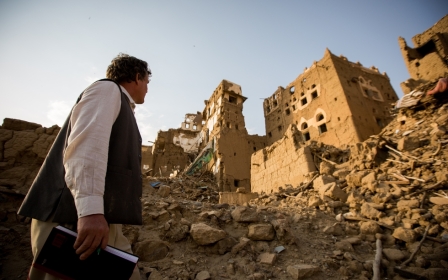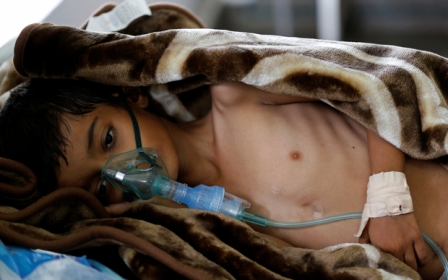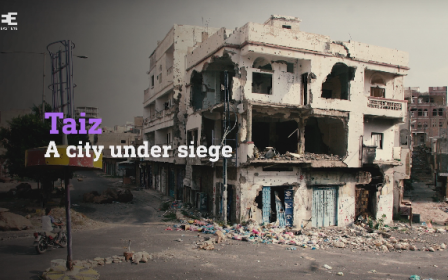Babies starved of milk as Yemen slides towards famine
TAIZ, Yemen - Lethargic and emaciated, 18-month-old Alawi Mohsen has spent the past six weeks lying on a hospital bed in Taiz’s al-Modhafar hospital.
At an age when he should be toddling around and bursting with energy, Alawi’s distended belly is a telltale sign of the severe acute malnutrition which would have ended his life without urgent medical treatment.
Doctors say Alawi’s condition has improved in the past month as a consequence of the care he has received since being brought into the hospital by field workers sent out from the clinic to find children at risk of starving to death.
Yet his under-developed young body is a stark testament to the fact that it is not only shooting and shelling that is claiming the lives of children born into war-torn Yemen.
According to recent United Nations figures, about 500,000 children under the age of five are suffering from malnutrition, with two thirds considered so undernourished that they could die unless they receive urgent medical treatment.
The number suffering from severe acute malnutrition has doubled in the past year.
Half of Yemenis suffering malnutrition as famine looms
Alawi, one of nine siblings, was born in Wadi al-Moasel, southwest of Taiz city, which has seen some of the fiercest fighting in Yemen’s war between Houthi rebels and forces loyal to Yemen’s exiled President Hadi.
During the past year, sustained clashes in the family’s neighbourhood resulted in Alawi’s mother being admitted to al-Modhafar hospital for treatment for psychological trauma at the same time as her son.
Meanwhile Alawi’s father, Saeed Mohsen, a construction worker, has been left jobless and destitute by the war.
As the family went hungry, it was Alawi, deprived of baby milk, who suffered most acutely, according to his older sister, Raja Mohsen.
“Since the beginning of the war, we’ve hardly ever have bread or tea. We sometimes eat rice but it is rare to find vegetables or fruit and we do not eat meat at all. But we didn’t suffer from malnutrition as badly as Alawi,” Raja, who is in her twenties, told Middle East Eye.
Raja said that her father could not bring himself to visit the hospital to see his traumatised wife and frail son, while the family largely now depends on charitable donations.
“He does not have any money to help, and he cannot bring himself to see his son and wife suffering,” she said.
Raja said her brother had also suffered from neglect because of his mother’s health issues.
"Until six weeks ago, he was starving to death. We could not help him at all but fortunately a team from the hospital came and brought both him and my mother here.”
Gangsters in war-torn Yemen ensnare women to do their dirty work
In a nearby bed, Maya Maaen Hizam, another 18-month-old, is also being treated for severe acute malnutrition.
One of seven siblings from the al-Dhabab area, which has also seen heavy clashes in the past year, Maya’s father Maaen believes she is a victim of circumstances.
“The war hasn’t stopped since her birth,” her father, Maaen Hizam, told MEE. “Maya is the only one of her siblings suffering from malnutrition. She was born at the wrong time.”
With instances of malnutrition rising sharply, doctors at al-Modhafar hospital opened a special clinic six months ago dedicated to finding and treating local children at risk of starving to death in Taiz and surrounding areas.
Jamal al-Mohaya, a doctor in the malnutrition department, said the new clinic had so far treated 23 children, although many of the medicines it needed were in short supply.
“The children who suffer from malnutrition belong to poor families, so they do not think of going to hospital, but we started to send out teams to visit the outskirts of Taiz city and bring those children in from their homes,” he said.
Mohaya confirmed that the hospital provided the children with medicine for free. The children’s families are meant to stay nearby, although many do not have enough money to do so and return to their homes.
But he believes that many other cases of malnutrition are going undetected in rural areas that the hospital’s field teams cannot reach because of continued fighting.
Taiz: A city under siege
While the Houthi siege of Taiz city was broken in August, the city is only safely accessible from the southwest, making the clinic difficult for many poor families to reach.
“Most of the affected children live in Taiz's Moza district and the western areas of Taiz, but we cannot get there because of the war, and it will cost a lot if we want to get there. I hope that international organisations can help them,” Mohaya said.
Yet the scale of Yemen’s humanitarian crisis, and the continued inaccessibility of many parts of the country to international aid organisations, means that there may not be much that can be done for children already dying.
To make their situation worse, UNICEF, the UN’s children’s agency, on Friday warned that the country was facing a cholera outbreak, with cases reported in both Sanaa, the capital, and Taiz.
Jens Laerke, a spokesperson for OCHA, the United Nations humanitarian office, told MEE that many areas of Yemen were now officially recognised as being in a state of “pre-famine”.
He said that the number of people are food insecure in the country had risen by 10 percent since June 2015 with seven million described as “severely food insecure”.
“We are highly concerned about these pre-famine conditions,” he said.
Laerke’s comments came after Stephen O'Brien, the head of OCHA, warned that the UN body had less than half of the resources it required and needed a further $880m to address Yemen’s worsening humanitarian crisis.
"More funding is urgently required for the scale-up of assistance across the country," O'Brien said. "The UN and our humanitarian partners are ready to do so, but donors need to support resources mobilisation efforts.”
But in Taiz, the prospect of international organisations and NGOs coming to the rescue of starving babies appears hopelessly remote.
“Taiz is not a safe place for those organisations to work, and even the few which do have their own priorities other than helping children,” Emad Ahmed, a social activist in Taiz city, told MEE.
Ahmed said it was difficult to get food aid to remote villages, and that even humanitarian aid which did reach Taiz city often ended up in the marketplace, rather than being distributed to those in most desperate need.
For now Alawi Mohsen is receiving the medicines and care he needs to stay alive. But Raja, his older sister, admitted that the rest of the family was living from day to day, never certain what or when they would eat again.
“I hope that charitable people will not forget my other siblings,” she said. “I don’t know if they have enough food or not.”
This article is available in French on Middle East Eye French edition.
Middle East Eye propose une couverture et une analyse indépendantes et incomparables du Moyen-Orient, de l’Afrique du Nord et d’autres régions du monde. Pour en savoir plus sur la reprise de ce contenu et les frais qui s’appliquent, veuillez remplir ce formulaire [en anglais]. Pour en savoir plus sur MEE, cliquez ici [en anglais].


